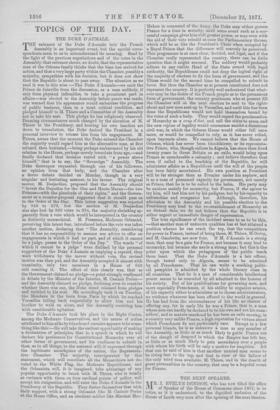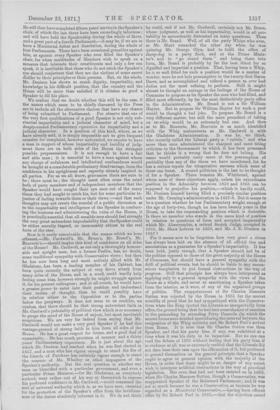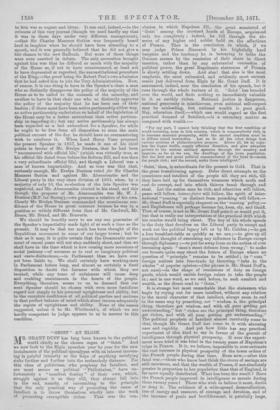THE NEXT SPEAKER.
MR. 3. EVELYN DENISON, who has now filled the office of Speaker of the House of Commons since 1857, is to retire, as it is understood, to the dignified seclusion of the House of Lords very soon after the opening of the next Session.
He will then have completed fifteen years' service in the Speaker's chair, of which the last three have been exceedingly laborious ; and will have held the Speakership during the whole of three, and a great part of a fourth Parliament,—it may be, if we are to have a Ministerial defeat and dissolution, during the whole of four Parliaments. There have been occasional grumbles against him, as against every Speaker who ever filled the Speaker's chair, for when multitudes of Members wish to speak on a measure that interests their constituents and only a few can speak, it is inevitable that those who do not catch the Speaker's eye should conjecture that they are the victims of some secret dislike to their principles or their persons. But, on the whole, Mr. Denison has shown so much dignity, impartiality, and knowledge in his difficult position, that the country and the House will be more than satisfied if it obtains as good a Speaker to fill his place. We confess that we doubt whether this will be the case, if the names which seem to be chiefly discussed by the Press are to include all the alternative choices that have any chance of being submitted to Parliament. For observe that one of the very first qualifications of a good Speaker is not only sub- stantial impartiality and a judicial character of mind, but a deeply-rooted Parliamentary reputation for impartiality and a judicial character. In a position of this kind, where, as we have already said, it is simply impossible not to give frequent occasion for complaint, however unfounded, we require to have a man in support of whose impartiality and lucidity of judg- ment there are on both sides of the House the strongest possible prepossessions. It is not enough to have a fair and able man ; it is essential to have a man against whom any charge of unfairness and intellectual confusedness would be brought at a considerable preliminary disadvantage, from the confidence in his uprightness and capacity already inspired in all parties. For as we all know, grievances there are sure to be ; there must be ; the thought must often cross the mind both of party members and of independent members that the Speaker would have caught their eye once out of the many times they had sought to catch hie, but for some particular in- justice of feeling towards them or their views :—and that such thoughts may not create the scandal of a public discussion as to the impartiality and intelligence of the Speaker in conduct- ing the business and administering the rules of the House, it is practically essential that all sensible men should feel strongly the very great antecedent improbability that the Speaker could be either secretly biassed, or inexcusably obtuse to the real facts of the case.
Now is it easily conceivable that the names which we hear oftenest,—Mr. Cardwell's, Mr. Bruce's, Mr. Brand's, Mr.
Bouverie's,—should inspire this kind of confidence on all sides of the House? Mr. Cardwell, as not only a thoroughly honour- able and upright man, but a former Peelite, has, no doubt, some traditional sympathy with Conservative views ; but then he has now been long and most actively allied with Mr. Gladstone, has been a leading member of his Cabinet, has been quite recently the subject of very fierce attack from many sides of the House, and in a word, could hardly help feeling some bias, however strongly he might struggle against it, for his present colleagues ; and at all events, he would have a greater power to enter into their position and understand their modes of thought, than he could possibly have in relation either to the Opposition or to the parties below the gangways. It does not seem to us credible, we confess, that there should be that strong antecedent faith in Mr. Cardwell's judiciality of political view which is so necessary to purge the mind of the House of unjust, but most inevitable suspicions. We are very far indeed from saying that Mr. Cardwell would not make a very good Speaker if he had this vantage-ground of strong faith in him from all sides of the House. He has a great respect for forms, and a good deal of equanimity. He has much precision of manner and a thirty years' Parliamentary experience. He is just about the age which Mr. Denison had reached when he was first elected in 1857, and a man who has vigour enough to stand the fire of the friends of Purchase has certainly vigour enough to stand the censure of Mr. Whalley or other impugners of the Speaker's authority. But the real question is whether any man so identified with a particular government, and even a particular Prime Minister,—for Mr. Gladstone, as everybody noticed, went rather out of his way at Greenwich to express his profound confidence in Mr. Cardwell,—could command the sort of universal authority which is, as we have seen, essential for the protection of the Speaker's office from the invidious- ness of the duties absolutely inherent in it. We do not think
he could, and if not Mr. Cardwell, certainly not Mr. Bruce, whose judgment, as well as his impartiality, would in all pro- bability be antecedently distrusted on many questions. Then there is Mr. Brand. Well, of all the party Whips who ever, as Mr. Stull remarked the other day when he was quizzing Mr. George Glyn, had to fulfil the office of sheep-dog to a party flock, and at the Prime Minis- ter's nod to " go round them " and bring them into form, Mr. Brand is probably by far the beet fitted for so dignified and impartial a position. That, having been a Whip, he is so well fitted for such a position would be a matter of wonder, were he not heir presumptive to the twenty-first Baron Deere, and as accomplished and refined a person as ever had duties not the most refining to perform. Still it might almost be thought an outrage to the feelings of the House of Commons to propose as its Speaker the man who had filled, and filled most efficiently, by far the most distinctively party office in the Administration. Mr. Brand is not a Sir William Hayter. But to propose Sir William Hayter for such a post would be thought a bad joke. To propose Mr. Brand is a very different matter, but still the mere precedent of taking an ex-whip would be an extremely bad one. And then, as to Mr. Bouverie, Mr. Bouverie is as much identified with the Whig malcontents as Mr. Cardwell is with the Gladstone Administration. It was he, we think, who recently called the Liberal party a " rabble," and who more than once administered the sharpest and most biting criticism to the Government to which it has been presumed that he thinks it a wrong that he does not belong. His name would probably carry more of the presumption of partiality than any of the three we have mentioned, for he has a certain repute for vituperative sarcasm which none of these can boast. A soured politician is the last to be thought of for a Speaker. There remains Mr. Whitbread, against whom none of these objections apply, unless his subordinate position in the Admiralty between 1859 and 1863 can be supposed to prejudice his position, which it hardly could, Mr. Denison himself having filled a precisely similar position. under Mr. Canning's administration in 1827-8. But it seems to be a question whether he has Parliamentary weight enough at the age of forty-two, though he has been twenty years in the House, to take the commanding position which is desirable. Is there no member who stands in the same kind of position in relation to questions of form and accepted impartiality which Mr. Abercrombie, a retired Scotch Judge, occupied in 1835, Mr. Shaw Lefevre in 1839, and Mr. J. E. Denison in 1857 I For it seems now to be forgotten how very great a stress has always been laid on the absence of all official ties and associations as a guarantee for a Speaker's impartiality. It has been held, justly enough, that a Speaker should not be of the politics opposed to those of the great majority of the House of Commons, but should have a general sympathy with the drift of political events, lest he should be liable to any uncon- scious temptation to put formal obstructions in the way of progress. Still that principle has always been interpreted as applying only to a general sympathy with the views of the
House as a whole, and never as sanctioning a Speaker taken from the interior, as it were, of any of the organized groups of politics. The reappointment of Sir Charles Manners Sutton was rejected by the House in 1835 for the merest scintilla of proof that he had sympathized with the Conserva- tives when the King ejected the Liberals so unexpectedly from office, the ground being that he had lent some shadow of sanction to the proceeding by attending Privy Councils (in which the merest forms were decided upon)during the interval between the resignation of the Whig ministry and Sir Robert Peel's arrival
from Rome. It is true that Sir Charles Sutton was then Speaker, and that his party bias, if any, was exhibited at a
time when it was his duty to be impartial. But no one can read the debate of 1835 without feeling that his party bias, if in evidence at all, was so extremely rarified that the Liberals did not dare base their case upon the affirmation of it, but preferred to ground themselves on the general principle that a Speaker ought to agree in general opinion with the majority of the House, in order that there might be no danger of any secret wish to interpose artificial obstructions in the way of practical legislation. But oven that had not been insisted on in 1833, when Sir Charles Manners Sutton, though a Conservative, was
reappointed Speaker of the Reformed Parliament ; and it was not so much because he was a Conservative, as because he was
regarded as a Ministerial Conservative,—having been offered office by Sir Robert Peel in 1835,—that the objection raised
to him was so urgent and bitter. It was said, indeed,—in the columns of this very journal (though we need hardly say that it was in those days under very different management), —that Sir Charles Manners Sutton was frequently heard loud in laughter when ho should have been attending to a speech, and it was generally believed that he did not give a fair chance to the new Radicals. But none of these things were even asserted in debate. The only accusation brought against him was that he differed so much with the majority of the House as, if not to have countenanced, at least not to have deprecated or regretted, the unconstitutional procedure of the King,—the proof being Sir Robert Peel's own admission that he had asked him to join the Tory Administration. Now, of course, it is one thing to have in the Speaker's chair a man who so distinctly disapproves the policy of the majority of the House as to be called to the counsels of the minority, and another to have in that chair one who so distinctly approves the policy of the majority that he has been one of their leaders ; if there must have been active partizanship either way, an active partizanship undertaken on behalf of the legislation of the House may be a better antecedent than active partizan- ship in impeding it ; but any active partizanship has always been regarded as a bad antecedent for a Speaker, for while he ought to be free from all disposition to stem the main political current of the day, he should have no overmastering wish to reinforce it. When Lord Harry Vane proposed the present Speaker in 1857, he made it one of his chief points in favour of Mr. Evelyn Denison, that he had been "unconnected with official life," (which was virtually true, as his official life dated from before the Reform Bill, and was then a very subordinate official life), and though a Liberal was a man of known impartiality. And so true was this that, curiously enough, Mr. Evelyn Denison voted for Sir Charles Manners Sutton and against Mr. Abercrombie and the Liberal party in the very close division of 1835, when, by a majority of only 10, the re-election of the late Speaker was negatived, and Mr. Abercrombie elected in his stead, and this though the proposer of Mr. Abercrombie was Mr. W. J. Denison (M.P. for Surrey),—we presume a relative of his own. Clearly Mr. Evelyn Denison commanded the unanimous con- fidence of the House in great measure because he was in a position so widely different from that of Mr. Cardwell, Mr. Bruce, Mr. Brand, and Mr. Bouverie.
We should be heartily sorry to see any one guarantee of the Speaker's impartiality made light of at such a time as the present. It may be that too much has been thought of the Republican movement in some of our larger towns ; but be that as it may, it is quite certain that the Democratic move- ment of recent years will not stop suddenly short, and that we shall have in the time which is now coining more occasions of social jealousy —of soreness as to real or imaginary political and caste-distinctions,--in Parliament than we have ever yet been liable to. We shall certainly have working-men in Parliament before long, and almost as certainly a fixed disposition to doubt the fairness with which they are treated, while any trace of unfairness will cause deep and rankling resentments in the hearts of the people. Everything, therefore, seems to us to demand that our next Speaker should be chosen with even more fastidious regard net simply to his personal uprightness and ability, but to the complete confidence of all political parties and sections in that perfect balance of mind which alone insures adequately the repute of uprightness and ability. None of the names suggested, unless it be Mr. Whitbread's, of which we are hardly competent to judge, appears to us to answer to this condition.












































 Previous page
Previous page